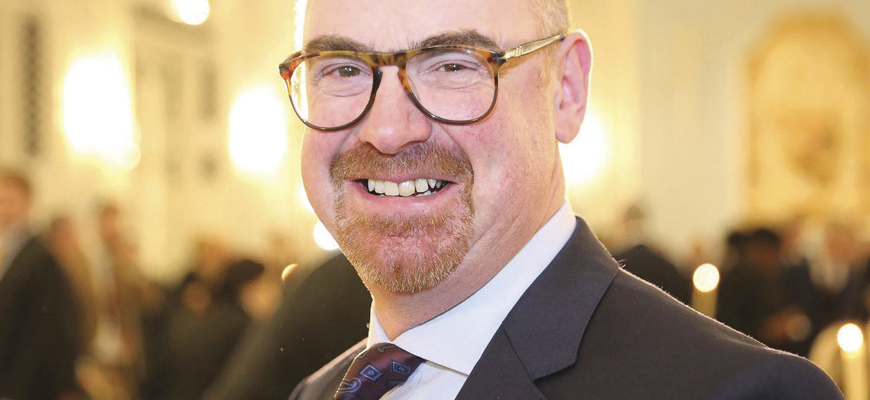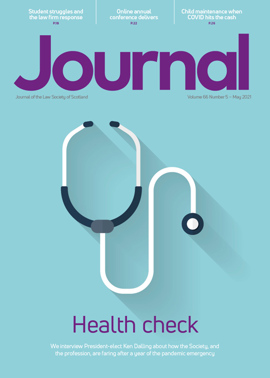Recovery phase?

“It would have been handy if we were doing it in less challenging times, but life is a challenge and hopefully rising to meet the challenge is what keeps us all going.”
Ken Dalling, about to take office as Law Society of Scotland President for 2021-22, recognises the scale of the task ahead. But as a criminal defence legal aid solicitor who has run his own Stirling firm since 1992, he is no stranger to facing adversity. Nor is he slow to speak his mind: after the 3% increase in legal aid rates was finally granted two years ago, he wrote about the struggle for fair treatment (Journal, May 2019, 25), concluding that ministers had reached the view that “to ignore the need for action would be not only politically unjustifiable but personally embarrassing”.
In fact it was the Society’s legal aid negotiating team that paved Dalling’s route to Council. “Oliver Adair brought myself and others in on the basis that we weren’t the normal Society faces and there was a concern that the Society needed to be seen as listening to voices outside the tent.” Then when Stirling Council member Ian Angus retired, Dalling was asked to consider standing. He is now into his fourth full term.
Though a defence solicitor since he qualified, Dalling had an all-round training in his home town of Airdrie with Bell Russell, “one of the old established town firms that did everything for everybody”. And it was family friend Dan Russell of that firm who was one of the main influences on his choosing the law: “a really nice guy, very competent, the kind of person you could rely on, a problem solver. Knowing as little as you do while still at school of what may lie ahead, I thought whatever he does I could maybe try that”.
Since joining Council he has broadened his experience, moving on from legal aid to the Professional Practice Committee, Guarantee Fund (now Client Protection Fund, which he latterly convened), the Anti-Money Laundering Committee, also taking charge when it was set up, and, three years ago, the Society’s board. All that along with various working groups – legal aid and other – and the Senior Solicitor Advocate Accreditation Committee.
Crisis role
Becoming an office bearer at the height of the COVID-19 pandemic was, however, in a different league. “It certainly wasn’t what I expected! But I’ve thoroughly enjoyed supporting Amanda [Millar] and having John Mulholland as Past President in support of both of us. There has been a lot of firefighting to be done, in a very difficult time for the profession generally and for individual practitioners and firms.”
Dalling admits to being “a bit daunted” at becoming President, but “thankfully, I’m not doing it on my own”. He looks forward to the support of his Vice President Murray Etherington, Amanda Millar as Past President, and the Society’s senior leadership, “a great team of very enthusiastic people”. He adds: “I continue to be impressed all the time by the quality and enthusiasm of all the Society’s staff, and also I may say the volunteer committee members, both lay and solicitors.”
A year ago the Society pushed through budget cuts to deliver a 20% cut in the practising certificate fee, to help support the profession through the pandemic. How has that affected the way it operates and what it can provide for members?
“That’s been a very interesting process, but it has been a matter of cutting your cloak according to your cloth. There have been efficiency and cost savings by people working remotely. I don’t see that as something that is particularly desirable or healthy to maintain in the longer run, but it hopefully will improve efficiency seeing people able to achieve a better work-life balance.
“It was right that we wondered at that early stage what the Society could do to support the profession at a difficult time, and budgeted accordingly. As things have turned out the Society’s finances have been perhaps stronger than we expected, because the profession has been more resilient than we feared it might.” Hence support will be maintained in the next practice year to the extent of a 10% reduction on the pre-COVID PC fee, “and that has been carefully budgeted for in order to make sure that everything the Society would otherwise be doing for its members, and everything its members would be expecting the Society to do, will still be available”.
That comes despite the additional pressures as the likes of digital conveyancing and virtual court hearings shot to the top of the agenda. “The work has hugely added to the demands on the Society,” Dalling confirms, “but our view has always been that better things happen when the Society is engaged in these processes than when it is not allowed to sit at the table. Sometimes the Society can bring a perspective which may otherwise not be at the top of the menu for some of our stakeholders – albeit I hate that term!”
Staying engaged
Will the experience of lockdown bring permanent changes in the way the Society itself works? “I think that’s inevitable. I think they will be changes for the better. But we have to be conscious that human interaction has a value of its own, and the feeling I get from across the Society staff is the vast majority will be keen to get back to working in a social environment rather than a remote one.” Blended working is likely to become the norm, as it is with Council and committee meetings.
As for interaction with members, “I think if anything the necessary adopting of technology has given a real chance for the wider membership to engage with the Society more than they used to. Amanda reports that her virtual tour of Scotland has engaged far more people than would ever be likely in reality, because of course it’s a very efficient way for members to engage.”
The Society has also been tracking the impact of the pandemic on solicitors, “in the context of what we called our COVID Resilience Group, to try and meet every week to hear members’ concerns and feed them into our engagement with the Government, with courts and others”, Dalling explains. “We certainly have not wanted any individual members or sectors of the membership to be left feeling isolated or out of touch simply because the physical office is closed.”
How, then, does the Society assess the profession’s state of health, as optimism grows over the recovery from COVID? The answer depends more on the practice sector than the size or location of the firm. “We know property in particular is on a boom. I would like to think that the high street firms who are heavily involved in property and private client work will be doing as well as they might otherwise have; hopefully the corporate life of Scotland is continuing to prosper, and the larger firms are able to service that. The concerns are at the sharp end of both criminal defence and family representation.”
Still awaiting delivery
Acknowledging Dalling’s direct interest, is the situation of legal aid practitioners the most serious issue facing the Society at present?
“It is certainly one of the most serious. The Cabinet Secretary engaged with Amanda, myself, Lorna and indeed with the bar associations of Edinburgh, Glasgow and Aberdeen very effectively and to a positive outcome in terms of the initial increases that have been approved for legal aid fees, but fees are so far behind it almost doesn’t pass the laugh test. It is a huge surprise to me that the criminal bar in particular, but the civil bar as well, has been resilient to the extent it has continued to operate at the woeful levels of remuneration compared with where they previously were, and they’ve never been good. I hope that the good faith shown by the Cabinet Secretary will be maintained by whoever is in post after the election, and that they will see the strength in investing in a legal aid system which delivers dividends for individual members and for society as a whole.”
Legal aid solicitors are fully aware that the money so far offered as emergency support to individual firms comes nowhere near the £9 million initially indicated as the resilience fund. But what more can the Society do to get the Government to deliver?
Pressure continues, Dalling reports, and the Government is believed to be examining how the scheme delivered against anticipated targets, and what new scheme could be proposed to deliver what was held out. “We will continue to engage, to protest the strength of the argument: it doesn’t weaken because it’s repeated, and I don’t think any responsible Government would want to be in post and see the demise of sections of the legal profession, particularly those who are so closely attached to delivering access to justice.”
More broadly, “We have continued to say that the underfunding of legal aid has been over the period of a generation. There is a long way to go, and there are huge concerns both about the likely impact on the health of the profession but also inevitably on access to justice – where is the next generation of criminal defenders coming from? Because at the moment it doesn’t seem to be attracting the bright young people out of university. And that’s a real shame.”
Be there for others
Beyond simply meeting these pressing problems, what does Dalling hope to see the Society achieve over the coming year?
“I have no particular agenda. I hope that doesn’t sound unfocused, because it’s not.” Having supported quite a number of Presidents while on Council, not always without challenge, he adds: “I care about doing the right thing, about getting it right, not just because somebody else thinks so but because I believe so. The Society is there to support its members. I hope it has done that through COVID. I think we have done that over my term on Council. If there has been anything with which I disagreed, I have made it known and either have been persuaded or I have persuaded others. It’s difficult to set aims other than to say that our main aim is to be there for the needs of our fellow solicitors and to ensure that the public interest is protected in terms of fair and proportionate regulation.”






